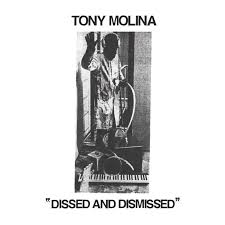You know when celebrities get interviewed about their deep love of a book or album or other piece of media? Often, they’ll demonstrate the depth of that love by saying that they’ve bought multiple copies (which they can easily afford) over the years to give to friends, thereby spreading the gospel. Sadly, for superstars and plebs alike, the sincerity of a gesture like this doesn’t mitigate the annoyance of someone trying to impose their taste on you. I’m sure a lot of us can relate, though – or, at the very least, have a band/artist/whatever who you want to thrust rudely into individuals’ faces and bark, "YOU WOULD LIKE THE FUCK OUT OF THIS. WHY AREN’T YOU ALL OVER THIS?"
Before San Francisco’s Tony Molina recorded as Tony Molina, he was the frontman of a band called Ovens, who sounded pretty much the same as Dissed And Dismissed, his debut album. Both Ovens and Tony Molina instill in me a deep desire for taste-imposing: their music languishes in relative obscurity, yet is catchy and accessible enough to appeal to a huge audience. It references and cribs from the pop and rock canon at will, but remains highly individual in its execution, and conceptually ingenious. If this website has flagship artists, Dissed And Dismissed‘s obvious comparison points – Weezer, Teenage Fanclub, Guided By Voices, the Beach Boys – are hardly going to be the first names on the team sheet. Molina’s hooks, though: they’re so big, they effortlessly capture folks who wouldn’t normally go within a mile of this powerpop glop.
There are two "things" – I wouldn’t call them gimmicks – to bear in mind about Molina, and they’re presumably related. Firstly, he is no melody purist, and is in fact a dyed-in-the-wool hardcore kid; most of his other bands, some of which are still extant, find him mining seams of enraged brutality. Secondly, he writes extremely short songs, with ninety seconds being the upper limit on Dissed And Dismissed, and most clocking in under one minute. These stats are achieved through economy, not speed – once a song’s first verse is through, the feeling is that to repeat it, but with different words, would be profligate, and matters generally conclude with some crunchy guitar triumphalism. (Although he sounds nothing like the Minutemen, Molina shares a certain ethos with them; when hardcore became locked into a verse-chorus-verse structure and warp speed velocity, they largely avoided both.)
Dissed… is less than twelve minutes long, which is not uncommon for a hardcore full-length but may cause a degree of tongue-clucking among an indie audience, where albums are generally expected to break the half-hour mark. The solution, you realise, is to listen to it three times in a slot normally reserved for one play-through. As much as "filler", in the context of a record, is in the ear of the beholder (and a grievously overused term), the only songs on here which could reasonably qualify is ‘Sick Ass Riff’, a plaintive instrumental given an ironic title, and 47-second acoustic turn ‘Wondering Boy Poet’, a Guided By Voices number. Like most songs by lo-fi-era GBV, it isn’t served terribly well by being divorced from its album context, or covered by someone else for that matter. The other ten songs, self-penned and entirely self-performed, are magnificent adverts for melody and monomania.
‘Nowhere To Go’ is the most blatant nod to Weezer, who Ovens hailed with greater regularity still, but busts out a solo with such clinically classical chops, it could be reappropriated for a power metal record. It also takes a lyrical tack that undermines the sonic sunshine ("I’ve got to leave this town / ‘Cos all my friends like me more when I am not around"); Molina has spoke of these songs being written during a dark period in his life, but if the subject matter is personal, the imagery has universal resonance. ‘See Me Through’, one of several songs charting relationship woes, leans a shade further towards the world-beating harmonies of Thin Lizzy. The last twenty seconds of ‘The Way Things Are’ may qualify as shredding.
However, for all Molina’s on-the-table metal fandom (bolstered by his Matador singles club release from last year, where he covered Metallica’s ‘Orion’), it’s his nineties indie jones that drives Dissed…. ‘Change My Ways’ fuzzes up the joint with a heartbreakingly good central riff which sounds like Archers Of Loaf or someone, and which would have totally slayed college radio/post-watershed MTV/etc twenty years ago. Molina’s talked in a few places about how much he digs Teenage Fanclub, who American audiences still seem to associate with their early Cobain-approved spiky stuff rather than their later onset of middle-aged spread, and ‘Spoke Too Soon’ bisects powerpop and grunge like the so-called Fannies at their zenith. ‘Don’t Come Back’ flirts with metalcore chugging before breaking into an eerily accurate J Mascis impersonation, which not any old schlub can do.
Dissed And Dismissed is basically all gold, as long as you’re not so jaded by years of inane indie chirruping that any combo of upbeat guitar melody and sad-lad lyrics induces a visceral reaction. Thanks in no small part to its 2014 re-release by esteemed indiepop imprint Slumberland (it was first pressed by an LA label called Melters last year), the dream of the hairslide-sporting janglers and the 2HXC4U moshpit bosses bonding over common ground no longer seems so far-fetched. And yet Tony Molina’s peculiar vision ought to reach much further still – including yourself. Check it out, it’ll be up your street. (If you think I’m addressing you personally, I am.)
<div class="fb-comments" data-href="http://thequietus.com/articles/15807-tony-molina-dissed-and-dismissed-review” data-width="550">


